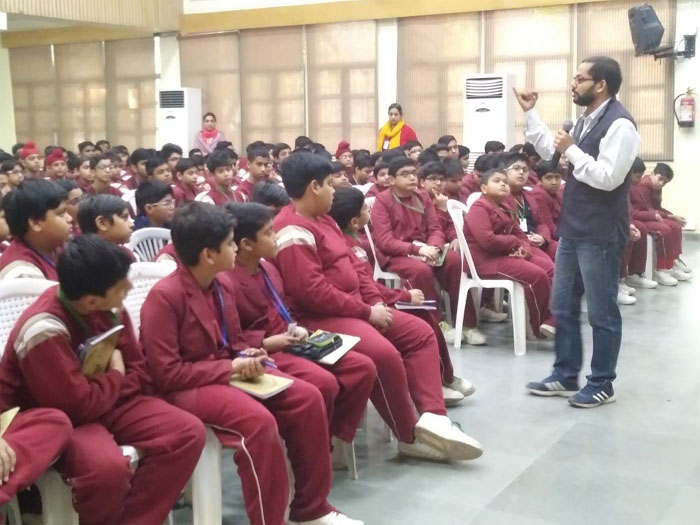Workshop on gender sensitisation for boys
Boys like to play with cars
and they are strong and tough.
Girls like to play with dolls
and they love make-up.
As kids we learn what boys and girls can or cant do
from grown-ups who say things without proof.
As kids we learn biases that seal our fate
and we grow up to be adults, realising everything a second too late.
Women and men are often restricted to particular roles in our society depending on the gender. It is high time we created awareness among school children especially boys about gender sensitisation to tackle beliefs which pertain to gender bias.
We at The Indian School believe that education and schooling is a process through which society builds the kind of individuals we wish to see in the world. Therefore, it is imperative that we lay strong emphasis on inculcating values of equality among our children.
Upholding this ideology and to help our children understand the need for gender equality, School organised a workshop on gender sensitisation for the boys of classes VI-XI in the School auditorium on 30 November 2017. The workshop that was a Delhi Police initiative, was conducted by Mr. Praveen Kumar, advocate Delhi High Court.
[gallery link="file" order="DESC"]
Mr. Kumar began by explaining the difference between the words sex and gender. He said that while sex is something we acquire at birth, gender is what society bestows upon us. He said that in a patriarchal society like ours, where stark gender roles, overt gender discrimination and a devaluation of women is ingrained into our daily lives, it is extremely important to identify and address this problem from a very young age.
Boys and girls start developing their gendered identities from birth. The upbringing at home also influences them. While egalitarian gender roles may not be present at home, School can become a space of transformation where children learn to question gender roles, identify areas of gender discrimination and work towards changing them. He said that in many families, in both rural and urban areas, while boys are encouraged to study and have a career, girls are taught to concentrate on household chores. Only when both boys and girls learn to question this typical gender bias, will the situation change for the better.
Mr. Kumar quoted several examples on how men are favoured and women are still denied social freedom in India. The very foundation of this discrimination is laid at the time of our birth. Our gender decides the kind of toys we get to play with. Boys are given guns and cars and girls have to be content with dolls. The clothes we wear depend on our gender. The question that arises here is- Who decides these norms?
He laid stress on the need to train boys because if boys are taught to understand how an egalitarian society is beneficial for all by questioning gender norms, only then will they learn to treat women as equals. Mr. Kumar was of the opinion that gender roles and inequalities are very contextual and rooted in cultural and social practices. Thus, to have a national policy addressing gender equality is not sufficient. He emphasised the need for clear directives to understand and address specific gender norms.
As a lawyer, Mr. Praveen Kumar talked to the students about the various IPC Sections pertaining to crime against women, highlighting the fact that every crime ends in a punishment. He urged the boys to become the torch bearers of change in society, encouraging them to do their part to ensure that we move towards a more equal and inclusive society, a society devoid of discrimination, one where women are not treated as inferior, and where equal opportunities and rights are given to all.
Students listened to the speaker with rapt attention, which put their sensitivity and genuine seriousness for the issue on display. There were questions asked to satiate the curiosity that the subject had rightly aroused among the young minds. There were enquiries like- Dont festivals like Rakshabandhan promote gender inequality as the brother vows to protect his sister, thus portraying her as a weaker being? among many others that described the many thoughts that had been ignited in the students thinking minds.
We need to build a gender-sensitive and gender-equitable society. Attitude formation among adolescents is crucial since they are still at an age where attitudes are malleable. We at School believe that archaic beliefs can certainly be reformed using such sessions.
Ms. Gandharvi Mukherjee.













